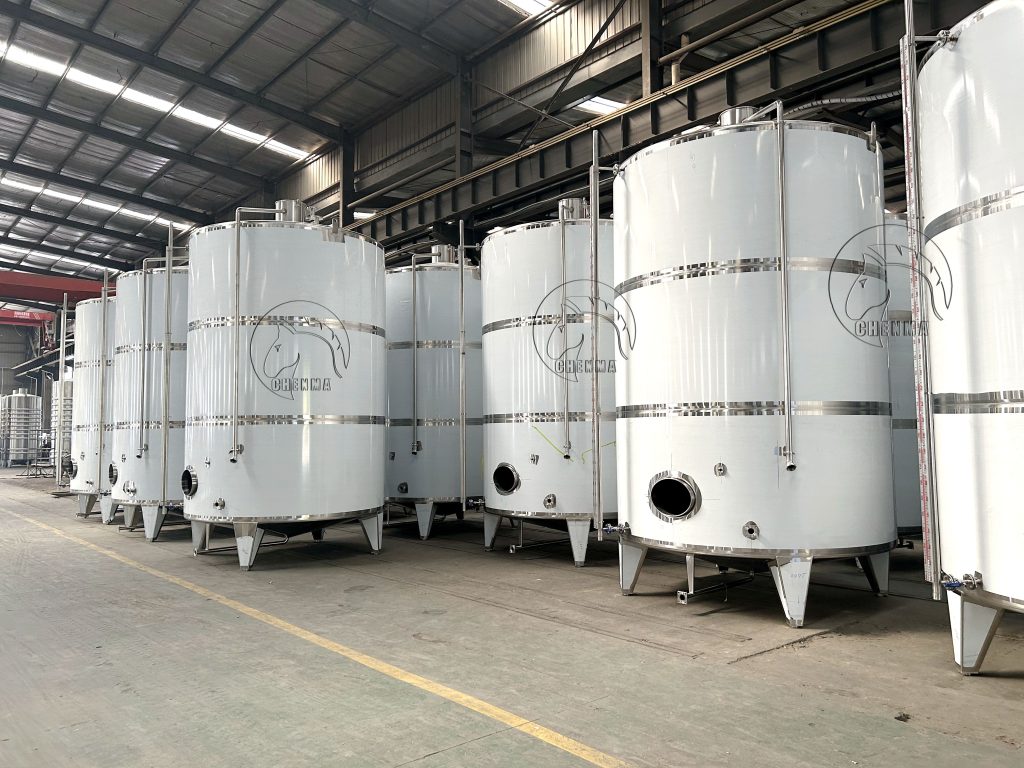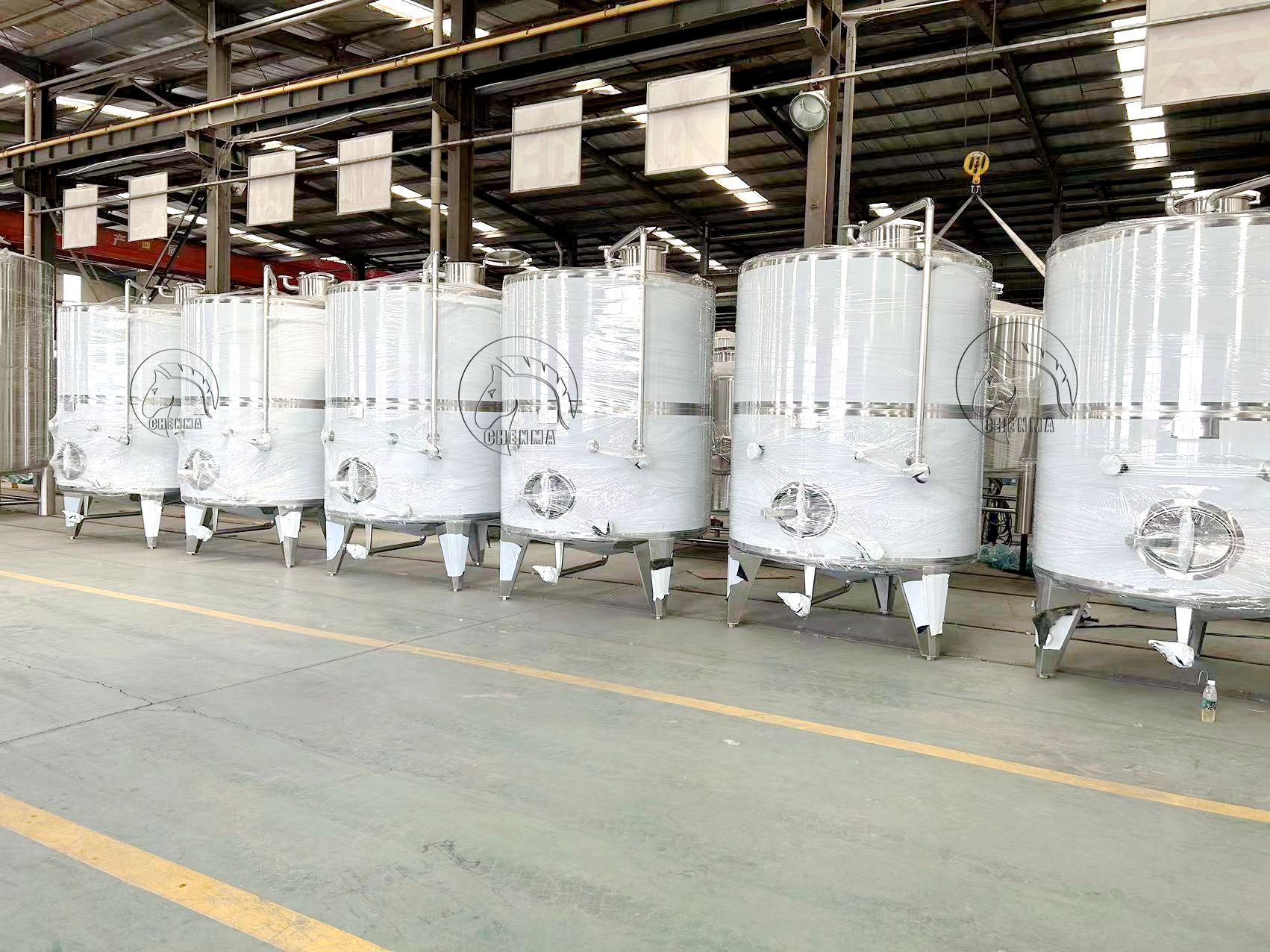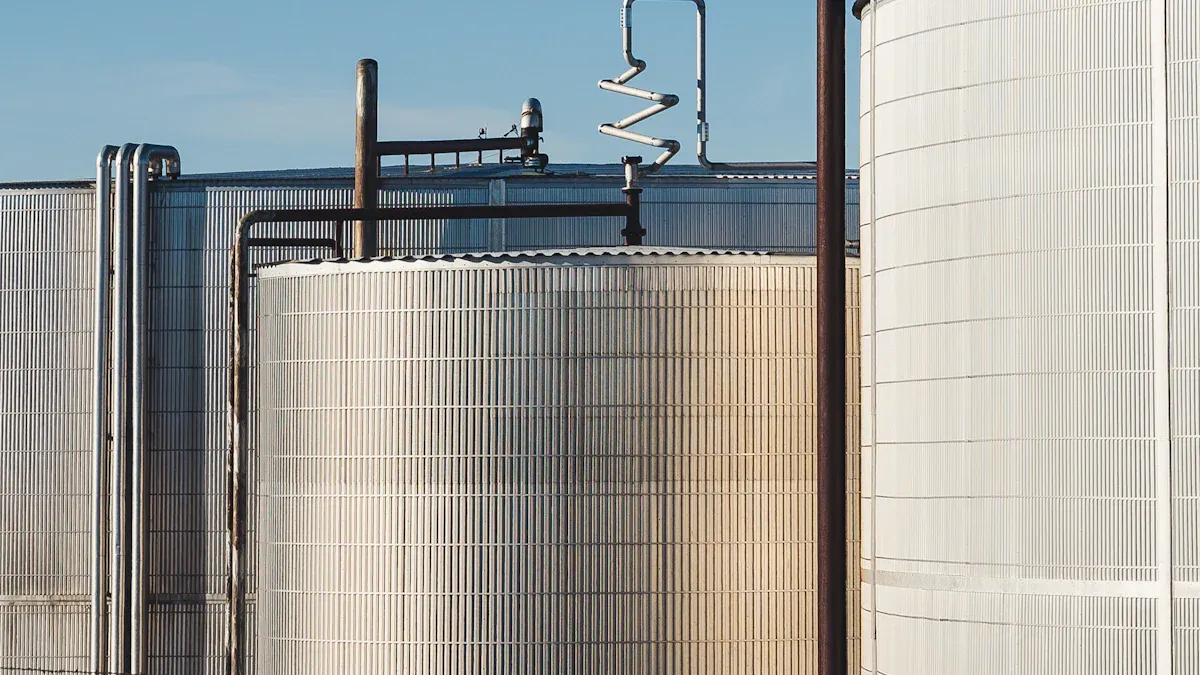
stainless steel oil tank
Shandong Chenma Machinery Co., Ltd. is a leading provider of stainless steel oil tank solutions, specializing in the food and beverage industry, particularly for alcohol and edible oils. Our state-of-the-art manufacturing processes ensure that every tank meets the highest standards of durability and hygiene. We offer customized solutions tailored to your specific needs, including design, manufacturing, installation, and ongoing technical support. Our experienced team is dedicated to simplifying your operations with turn-key projects that enhance efficiency and quality. Contact us today for a quote and let us help you find the perfect stainless steel tank solution for your business!
Types of Stainless Steel Oil Tanks
Stainless steel oil tanks come in various designs tailored to meet specific operational needs. Single-walled tanks offer basic storage solutions for non-hazardous liquids, while jacketed tanks provide essential temperature control for sensitive processes. Agitated tanks ensure proper mixing of materials, and conical bottom tanks facilitate effective sediment management. Understanding these distinctions allows industries to select the most appropriate stainless steel oil storage tanks type for their specific applications, enhancing efficiency and product quality across diverse sectors.
Single-walled tanks represent the most basic design in stainless steel storage solutions. These tanks consist of a single layer of stainless steel, making them suitable for storing non-hazardous liquids. Their simplicity and cost-effectiveness make them a popular choice in residential settings and small-scale operations. However, due to their lack of insulation or temperature control features, they are not ideal for applications requiring precise thermal management or for storing hazardous materials.
Jacketed tanks are designed with an additional outer layer, known as a jacket, which allows for temperature control by circulating heating or cooling fluids between the two layers. These tanks feature small indentations on the outer surface that create channels for the temperature-control fluid. This design enhances heat transfer efficiency, making it suitable for processes requiring precise thermal control. This design of stainless steel heating oil tank is particularly beneficial in industries such as food and beverage processing, pharmaceuticals, and chemical manufacturing, where maintaining specific temperature ranges is crucial. This feature is particularly beneficial for:
High-Viscosity Oils: Such as palm oil or tallow, which require heating to remain fluid.
Temperature-Sensitive Applications: Where maintaining a specific temperature is critical to product quality.
Agitated tanks incorporate mixers or agitators to ensure thorough blending of materials within the tank. This feature is particularly important in processes where oils must be mixed with additives or other substances to achieve a homogeneous product. The agitation helps maintain uniformity in product consistency and quality, making these tanks essential in industries such as cosmetics and food processing. This feature is particularly beneficial for:
Types of Oil Stored: Commonly used for storing emulsified oils, paints, or any liquid that benefits from constant agitation.
Common Uses: Paint manufacturing, food production (e.g., sauces), and chemical processing.
Conical bottom tanks are specifically designed with a tapered base that facilitates easy draining and cleaning. This design is particularly advantageous in industries like olive oil production, where effective sediment management is critical. The conical shape allows for efficient removal of sediment or residues that may accumulate during storage or processing. As a result, these tanks not only enhance cleanliness but also contribute to maintaining the quality of the stored product. This design is particularly useful for:
Edible Oils: Ensures complete drainage, minimizing waste.
Animal Fats: Facilitates easier cleaning and maintenance.
The cone shape also aids in the mixing process when used with agitators.
Application of stainless steel oil tank
Stainless steel oil tanks play a critical role in the storage of various oils by providing a safe, hygienic, and controlled environment. Whether for olive oil, sunflower oil, or animal fats, these tanks are designed with features that enhance their functionality while preserving the quality of the oils stored within them. As the demand for high-quality oils continues to grow, investing in stainless steel storage solutions becomes increasingly important for producers aiming to maintain product integrity over time.
Olive oil is particularly sensitive to environmental factors such as light, air, and temperature. Stainless steel tanks designed specifically for olive oil storage offer several advantages. They are often equipped with inert gas fittings, which help prevent oxidation by displacing oxygen within the tank. This feature is crucial because exposure to air can lead to rancidity and degradation of flavor. Additionally, many stainless steel olive oil storage tanks have conical bottoms that facilitate easy sediment removal, ensuring that any impurities or residues can be efficiently drained out without contaminating the oil.
The non-reactive nature of stainless steel ensures that it does not impart any flavors or odors to the olive oil, preserving its original taste. Furthermore, stainless steel is impenetrable by moisture and sunlight, which helps maintain a stable environment for the oil. This is vital, as fluctuations in temperature or exposure to light can accelerate the oxidation process, thereby shortening the shelf life of the oil.
Sunflower oil, known for its higher smoke point compared to olive oil, also benefits from being stored in stainless steel tanks. These tanks can come equipped with advanced temperature control systems that maintain optimal storage conditions. By regulating temperature, these systems help prevent degradation due to heat exposure. The durability of stainless steel ensures that these tanks can withstand varying temperatures without compromising their structural integrity.
Moreover, just like olive oil tanks, sunflower oil storage solutions often include features designed to minimize contamination risks. The smooth surfaces of stainless steel are easy to clean and sanitize, which is essential for maintaining food safety standards in storage facilities.
Animal oil require careful handling due to their propensity to spoil quickly if not stored properly. Stainless steel tanks provide a hygienic environment that minimizes contamination risks while offering durability against the corrosive nature of some animal oil. The non-porous surface of stainless steel prevents bacteria from adhering and growing, making it an ideal choice for storing fats that could otherwise spoil rapidly.
Additionally, many stainless steel tanks designed for animal oil feature specialized accessories such as nitrogen injection rings and hermetic valves that allow for inert atmosphere preservation. This technology helps keep animal fats fresh by reducing their exposure to air and moisture during storage.
WHY CHOOSE CHENMA
Production Excellence
Chenma adheres strictly to a detailed production flowchart, ensuring that every stainless steel oil tank is manufactured with precision. We will manufacture the perfect custom stainless steel tanks for you using advanced welding techniques. This meticulous attention to detail in manufacturing fosters confidence among clients regarding the reliability of their tanks.
Quality Control
The company implements stringent quality control measures at every stage, from material selection to final product verification. We have passed ISO9001-2005 quality system certification, ISO14001-2015 environmental management system certification, OHSAS18001-2007 occupational health management system certification, EU CE certification.
Outstanding After-Sales Service
Chenma offers 24-hour online support and a five-year guarantee on its products, demonstrating a commitment to long-term customer relationships. Additionally, their full lifecycle support ensures that clients have access to assistance whenever needed, reinforcing trust in their services.
Expert Installation Services
With qualified engineers boasting over 15 years of experience, Chenma provides on-site installation services for its stainless steel oil tanks. This expertise not only facilitates a smooth installation process but also assures clients that their tanks will be set up correctly and efficiently.
Characteristics of Stainless Steel Oil Tanks
Corrosion Resistance
One of the most significant advantages of stainless steel is its exceptional resistance to corrosion. Stainless steel is an alloy that typically contains iron, chromium, and nickel. The chromium content forms a passive oxide layer that protects the underlying metal from rusting. This property is crucial for oil storage tanks, as oils can contain various compounds that may corrode other materials. For instance, stainless steel types 304 and 316 are commonly used due to their robust corrosion resistance, making them suitable for diverse applications in both food processing and industrial settings.


Durability and Strength
Stainless steel oil tanks are widely recognized for their remarkable strength and exceptional durability. These tanks are engineered to withstand high pressures and elevated temperatures without the risk of deforming or leaking. This inherent durability is especially crucial in various industrial applications, where tanks must endure rigorous and often challenging conditions. Furthermore, the structural integrity of stainless steel enables the construction of thinner walls compared to traditional carbon steel tanks, all while maintaining the necessary strength. This advantage can result in significant cost savings in material usage, making stainless steel an efficient choice for many industries.
Hygienic Properties
When it comes to applications involving food-grade oils, maintaining high hygiene standards is of utmost importance. Stainless steel stands out as an exceptional material due to its non-porous nature, which prevents the harboring of bacteria and other contaminants. This characteristic makes stainless steel an ideal choice for the storage of food products. Additionally, the smooth surface finish of stainless steel oil tanks not only enhances their aesthetic appeal but also facilitates easy cleaning and maintenance. This ensures that these tanks meet stringent health regulations and contribute to overall food safety.


Temperature Control
Proper temperature control is essential for the optimal storage of various oils, as many of them require specific temperature conditions to maintain their quality. To achieve this, stainless steel oil storage tanks can be engineered with specialized heating or cooling jackets. These jackets help regulate the temperature effectively, ensuring that the oils remain within the ideal range. This feature is especially advantageous for sensitive oils, such as olive oil, which can deteriorate if subjected to excessive heat or significant temperature fluctuations. Maintaining stable conditions helps preserve the integrity and flavor of these valuable oils.



